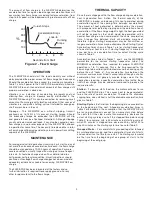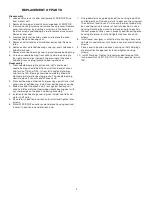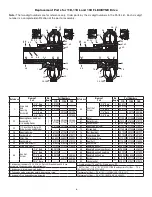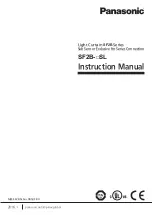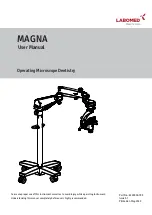
1
WARNING: Because of the possible danger to persons(s) or
property from accidents which may result from the improper
use of products, it is important that correct procedures be
followed: Products must be used in accordance with the
engineering information specified in the catalog. Proper
installation, maintenance and operation procedures
must be observed. The instructions in the instruction
manuals must be followed. Inspections should be made
as necessary to assure safe operation under prevailing
conditions. Proper guards and other suitable safety devices
or procedures as may be desirable or as may be specified in
safety codes should be provided, and are neither provided
by Dodge nor are the responsibility of Dodge. This unit and
its associated equipment must be installed, adjusted and
maintained by qualified personnel who are familiar with the
construction and operation of all equipment in the system
and the potential hazards involved. When risk to persons
or property may be involved, a holding device must be an
integral part of the driven equipment beyond the speed
reducer output shaft.
WARNING:
To insure that drive is not unexpectedly started,
turn off and lock out or tag power source before proceeding.
Failure to observe these precautions could result in bodily
injury.
DESCRIPTION
FLEXIDYNE dry fluid couplings are a unique concept to provide
soft start and momentary overload protection for all types
of driven equipment. Standard NEMA-B motors with RPM
base speeds of 1750, 1160 or 860 are commonly used with a
FLEXIDYNE, yet other available power sources may be used with
the FLEXIDYNE.
The dry "fluid" in the FLEXIDYNE is heat treated steel shot. A
measured amount, referred to as flow charge, is added into a
housing which has been keyed to the motor shaft. When the
motor is started, centrifugal force throws the flow charge to the
perimeter of the housing, packs it between the housing and the
rotor which in turn transmits power to the load.
After the starting period of slippage between housing and rotor
the two become locked together and achieve full load speed,
operating without slip and with 100% efficiency.
Consequently, the motor accelerates instantly to base speed,
while the load starts gradually and smoothly.
Motor Shaft
Flow
Charge
Rotor
Housing
Figure 1 - Flexidyne Coupling
INSTALLATION
Install sheave on driven hub using screws and lockwashers
furnished. Torque screws to 580 inch-pounds. Do not use
sheaves with set screws that exert pressure on the driven hub;
they may distort the driven hub and damage the needle bearing.
Slide the FLEXIDYNE Drive on the motor shaft with collar as
close to motor as possible. Tighten key set screw securely
against motor shaft key. Tighten shaft set screw against motor
shaft. Note that drive hub must be installed on the motor shaft (or
on other installations it must be the first part of the FLEXIDYNE to
receive power from the power source) to permit proper operation
of the FLEXIDYNE Drive.
START-UP
1. The flow charge recommended in Table 1 is the amount
per cavity required. To assure a more even initial
distribution of flow charge, remove filler plugs and pour ½
of recommended amount in both cavities. Replace filler
plugs being careful to clear threads of any flow charge.
Manually rotate the FLEXIDYNE housing several turns.
Remove filler plugs and pour in remaining amount of flow
charge. Clear threads as before, replace filler plugs and
torque to 200 in.-lbs. on sizes 11D & 11DL; 700 in.-lbs on
size 15D.
2. Attach AC ammeter (conventional clamp-on or equivalent)
to one line of the AC motor. Set range to cover 200% of
motor nameplate current.
3. Note maximum allowable acceleration time for FLEXIDYNE
as stated in Tables 1 and 2. Note: Table 2 lists starting time
capacity for starting cycles occurring more than once every
2 hours.
4. Push start button. Observe motor current during load
acceleration and number of seconds required to reach full
speed.
Increase amount of flow charge if:
A. Acceleration time reaches maximum allowable before
load is up to speed. Turn off power immediately if this
time is reached.
B. Acceleration amperage is below motor nameplate
Decrease amount of flow charge if:
A. Acceleration time is less than 1½ seconds.
B. Acceleration amperage is above 200% of motor
nameplate.
CAUTION: The FLEXIDYNE rotor must slip during
acceleration to allow flow charge to become evenly
distributed in the FLEXIDYNE housing. There-fore, DO NOT
ALLOW FLEXIDYNE MECHANISM TO RUN "FREE" (that
is, without a load on the driven end), otherwise an out-of-
balance condition may result, damaging mechanism.
INSTRUCTION MANUAL FOR DODGE
®
No. 11 D, 11 DL & 15D FLEXIDYNE DRIVE
These instructions must be read thoroughly before installation or operation.


